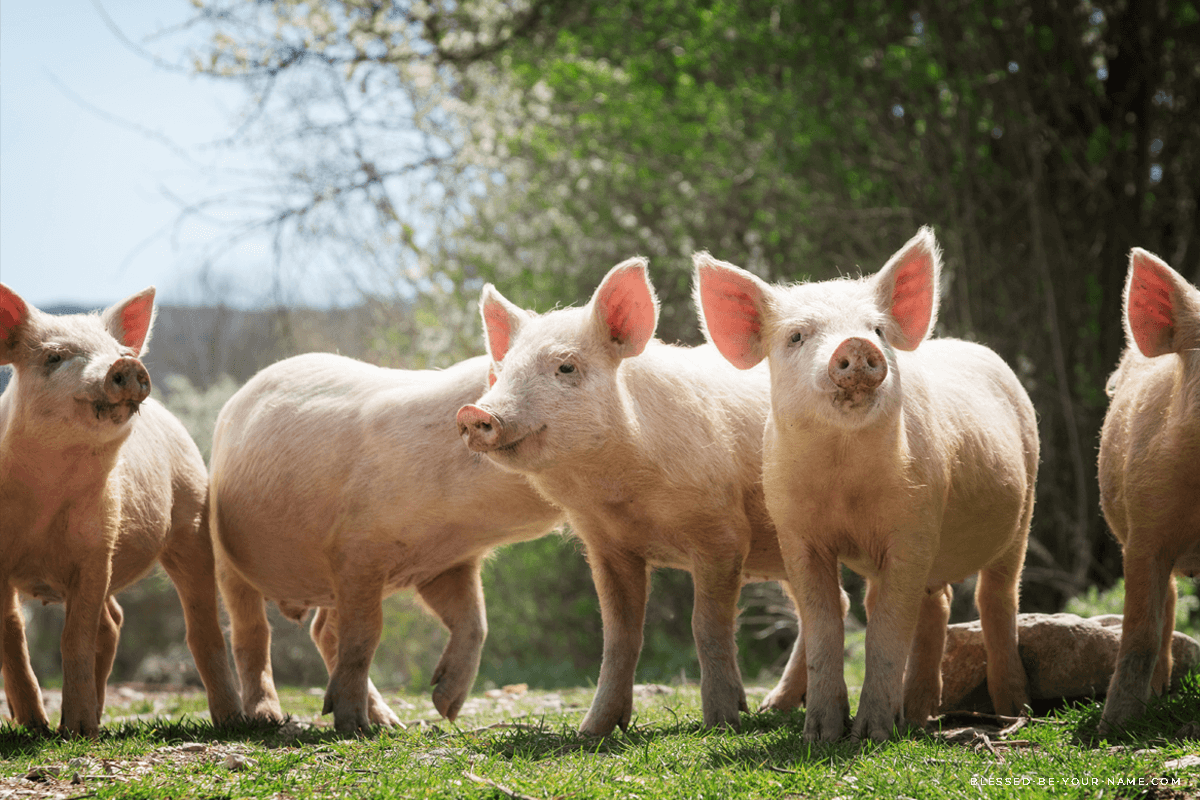

The question of whether Christians can eat pork often sparks a lot of discussions, especially considering the dietary laws found in the Old Testament.
Let’s dive into the Bible and explore how things have changed from the days of Adam and Eve, through the laws given to Israel, and ultimately, what it means for us as followers of Christ today.
When God first created man, He made it clear what food was meant for us. In Genesis 1:29, God says:
“Behold, I have given you every plant yielding seed that is on the face of all the earth, and every tree with seed in its fruit. You shall have them for food. (Genesis 1:29)
So, at the very beginning—before the fall—humans were given plants to eat.
The Bible doesn’t specifically mention when people started eating meat, but we see a shift after Adam and Eve’s disobedience in the Garden of Eden.
God Himself sacrificed an animal to clothe them with skins, which suggests that this was the first instance of animals being used for something beyond companionship.
Fast forward to the time of Noah. After the flood, God expanded the dietary options, telling Noah:
“Every moving thing that lives shall be food for you. And as I gave you the green plants, I give you everything.” (Genesis 9:3).
At this point, there wasn’t any distinction between clean and unclean animals—God gave permission to eat “every moving thing,” which means it’s pretty likely that Noah, Abraham, Isaac, Jacob, and even Joseph had pork in their diet at some point.
Things changed dramatically after the Exodus.
When God gave Moses the law, He introduced specific dietary restrictions for the Israelites.
In Leviticus, God clearly outlined which animals were considered clean and unclean, and among those forbidden was pork.
“And the pig, because it parts the hoof and is cloven-footed but does not chew the cud, is unclean to you. You shall not eat any of their flesh, and you shall not touch their carcasses; they are unclean to you.” (Leviticus 11:7-8).
God took back the previous permission to eat all kinds of animals, and pork was officially off the menu for the Israelites.
But why did God make this change?
There are two primary reasons often suggested for God’s dietary laws for the Israelites:
The Israelites were God’s chosen people, and these laws helped them stand out from the nations around them.
By following these specific guidelines, including what they could and couldn’t eat, the Israelites showed that they were dedicated to God.
They lived, worshiped, and ate in ways that were distinct, and this separated them from the pagan nations who surrounded them.
Many scholars believe that the dietary laws also had a practical purpose—keeping the Israelites healthy.
Pigs, for example, are scavengers that eat almost anything, including garbage, feces, and even rotting animals.
Without proper preparation and hygiene—especially in desert conditions where water is scarce—pork could easily become a breeding ground for disease.
So, in a sense, these laws likely helped protect the Israelites’ from health issues long before modern hygiene practices existed.
After Jesus’ death and resurrection, things changed once again.
In Acts 10, Peter receives a vision from God in which he is explicitly told to eat animals that had previously been considered unclean under Jewish law:
And there came a voice to him: “Rise, Peter; kill and eat.” (Acts 10:13). Peter hesitated, but God replied, “Do not call something unclean if God has made it clean” (Acts 10:15).
This vision wasn’t just about food—it was a broader message that the Gospel was for everyone, not just the Jews. But it also signified a shift in the dietary laws. Christians are no longer bound by the old restrictions, including those regarding pork.
As followers of Christ, we have the freedom to eat pork if our conscience allows it. The dietary restrictions that once applied to the Israelites were largely ceremonial and symbolic, pointing toward the coming Messiah.
Now that Christ has fulfilled the law, we’re no longer bound by these Old Testament dietary rules.
However, if someone feels convicted not to eat pork, that’s okay too.
Paul says in Romans 14:14, “I know and am convinced on the authority of the Lord Jesus that no food, in and of itself, is wrong to eat. But if someone believes it is wrong, then for that person it is wrong.”
The key is to honor God in whatever decision you make.
If your conscience is clear and allows you to eat pork, do so and praise God.
If not, follow your conviction and still praise God.
Ultimately, whether or not we eat pork doesn’t define our relationship with God.
Through Christ, we are freed from the old dietary laws, and now we live under grace.
But while we have freedom, it’s equally important to respect the convictions of others.
If someone feels strongly against eating certain foods, we should honor their stance and not pressure them to change.
What truly matters is that we live in a way that honors God and shows love to others.
Whether we choose to eat pork or abstain, let’s do it all for the glory of God.

We’re John and Ivy, offering resources for biblical names, Christian gift ideas, and faith-based products. Join us in celebrating faith and creativity with names, quotes, and Bible verses transformed into meaningful artworks.
